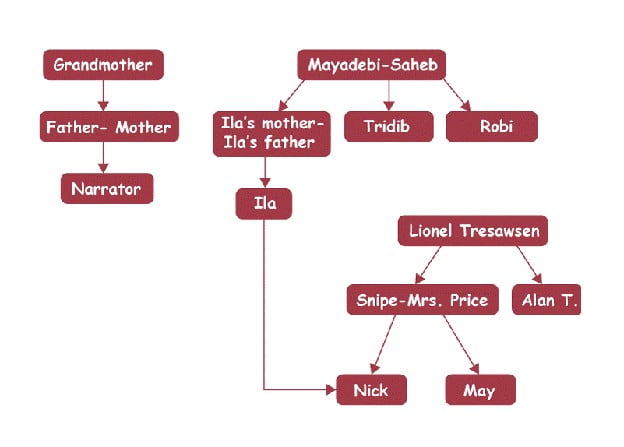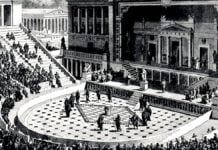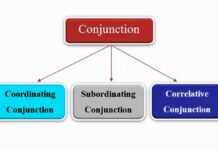Amitav Ghosh’s novel The Shadow Lines is a rich tapestry of characters, each with their unique complexities and motivations. The novel’s protagonist, an unnamed young boy growing up in Calcutta, India, narrates the story, providing an intimate perspective on the lives of those around him. He pays particular attention to his uncle Tridib, grandmother Th’amma, and cousin Ila. In addition, he shows their relationship with the Price family, particularly the romance between May Price and Tridib, as well as Ila’s marriage to Nick Price. He also portrays events in the life of Lionel Tresawsen, the Price family patriarch with whom Tridib lived as a child. He describes how Tridib’s worldliness left a big impression on him at a young age and shaped his ideas about the parts of the world he hadn’t seen. The narrator writes about his painful, unrequited feelings for Ila. He depicts his grandmother as stubborn and set in her opinions about the world around them. Her decision to return to Dhaka in search of her uncle and attempt to bring him home with them brings about their violent encounter with a mob and causes Tridib’s death.
In the first section, the narrator provides individual portraits of the members of his family and their social circle, ending with Ila’s realization that the narrator has been in love with her. In the second section, he shows the events leading up to the riots and Tridib’s murder. The narrator encircles this main event, continually forestalling the story’s climax while making it clear that Tridib died. The novel ends with May recounting Tridib’s death at the hands of a mob as he attempted to save her.
Ghosh explores the complex issue of individual and collective identity. Characters like Tha’mma, Ila, and the unnamed narrator wrestle with their sense of belonging and face experiences of displacement. The novel questions standard versions of history and emphasizes the role of personal memories and subjective narratives in shaping our understanding of the past. The book also interrogates the validity of national borders (the “shadow lines”) and illustrates the artificiality and violence of partition. It explores the irony of nationalism, where people are divided by imaginary lines. The line between reality and illusion blurs throughout the novel. Tridib’s tales, for example, shape the narrator’s perception of reality, illustrating the power of stories and imagination. Thematic preoccupations include the fluidity of time and space and the various ways these can be experienced. Ghosh deals with the contradiction between communal violence and personal peace, highlighting the long-lasting effects of historical violence on individual lives and relationships.
The characters in the novel are intricately woven into the fabric of the narrative, contributing to the exploration of various themes such as identity, nationalism, and the impact of historical events on individual lives. They contribute to the novel’s depth and complexity, compellingly exploring identity and memory.

The Narrator
The protagonist, who narrates the novel, is an unnamed, sensitive and introspective young man from Calcutta. A young boy growing up in the tumultuous era of India’s Partition, he is a curious and observant individual. He is profoundly influenced by family stories and the dichotomy between the home and the world, which encourages his curiosity about national borders and communal differences. He adores his uncle, Tridib, and enjoys his stories about history and foreign places. His view of the world is significantly shaped by what Tridib shares with him. The narrator is deeply affected by the events around him, particularly the death of his beloved uncle, Tridib. The narrator’s journey of self-discovery is interwoven with the broader historical narrative, providing a poignant insight into the impact of partition on individuals and families. His character represents the complexities of identity, memory, and the impact of historical events on personal narratives.
Tridib
The narrator’s eccentric uncle, Tridib, is a significant character in the novel. He is a charismatic, enigmatic, free spirit who defies societal expectations. He is a dreamer and a romantic, often seen as an outsider by his more conventional family members. Tridip is an intellectual and avid traveller who introduces the narrator to the world beyond his immediate surroundings. As a child, Tridip lived in London with the Price family while receiving medical care. He develops romantic feelings for May Price as they engage in an exchange of letters. In the book’s second half, the narrator recounts his visit to Dhaka with their grandmother. He dies at the hands of a mob while trying to protect May. Tridib’s untimely death leaves a profound void in the narrator’s life, symbolizing the loss of innocence and the harsh realities of a changing world. Tridib’s character embodies the novel’s exploration of borders, both physical and metaphorical. His experiences and relationships contribute significantly to the narrative’s development.
Tha’mma
The narrator’s grandmother, Tha’mma, is a strong and formidable figure, a pillar of support for her family amidst the political and social upheavals of the time. Born in Dhaka before the partition, her memories and views on nationalist sentiment and territorial boundaries contribute to the novel’s exploration of the partition’s personal and political dimensions. She is a staunch advocate for education and independence, particularly for women. Tha’mma’s unwavering belief in the importance of family and tradition anchors the narrative, providing a sense of stability and hope amidst the chaos. She dislikes both Ila and Tridib, the former for her abandonment of India and the latter for his refusal to use his family connections. Her determination to bring her uncle home from Dhaka resulted in Tridib’s death.
Ila
Ila, the narrator’s cousin, represents the allure of a distant and idealized world. She represents the complexities of cultural identity, being of mixed heritage. Her character is torn between her English upbringing and her Indian roots. She is beautiful, intelligent, and sophisticated, embodying the narrator’s dreams and aspirations. The narrator is romantically interested in her from a young age and frequently feels hurt by her flippant treatment of him. When he inadvertently reveals his feelings, she expresses sympathy. She shows an inclination to be dishonest at times, fabricating stories that make her life seem more glamorous. She comes from a wealthier background than the narrator and, seemingly as a result, treats foreign places with casual boredom. Later in life, she shows a strong preference for Western culture, as she believes India is stifling her freedom. She marries Nick Price and stays with him even after he cheats on her with multiple women. Ila’s life choices and relationships with other characters reflect the novel’s broader themes, particularly the impact of historical events on personal lives.
May Price
An English woman, May Price, adds a foreign perspective on the postcolonial cultural clash. She is a family friend of Tridib and the narrator. She is a professional oboist with a British orchestra. She develops a close epistolary friendship with Tridib and eventually falls in love with him. The narrator visits her on a few occasions and discusses memories of Tridib. She ultimately tells him that she blames herself for his death. May’s relationship with Tridib is central to the novel, exploring themes of love, loss, and the complexities of human relationships. Tridib’s love for her and the mystery behind her character contribute to the story’s intrigue.
Nick Price
Nick Price is the younger brother of May and Ila’s close friend. He is a family friend and the narrator’s school friend. His character represents the colonial legacy and the impact of historical events such as World War II. Nick frequently makes lofty comments about the future of business and industry, though it is revealed that he lost one of his jobs because he was accused of embezzlement. He marries Ila, who treats him with reverence throughout the book. The narrator expresses jealousy and frustration towards him. It is later revealed that he is engaging in multiple affairs, though the marriage continues. Nick’s experiences in London and his interactions with the narrator provide a lens through which the novel explores themes of cultural exchange and the intertwining of personal and collective histories.
Jethamoshai
Jethamoshai is Th’amma’s uncle. She describes his efforts to care for her family in her youth. She travels to Dhaka to “rescue” him, only to cause his death at the hands of a violent mob. Jethamoshai is a symbol of a bygone era, a man deeply rooted in tradition and nostalgia. Despite the political turmoil, his insistence on returning to his ancestral home in Dhaka reflects a deep attachment to his heritage and a desire to preserve the past. Jethamoshai’s tragic death serves as a reminder of the fragility of tradition and the inevitability of change.
The Narrator’s Parents
The narrator’s parents significantly shape the protagonist’s development and understanding of the world. They provide stability and support amidst the turbulent times of India’s partition while representing different aspects of Indian culture and tradition. Their attitudes and actions reflect the societal norms and expectations of the time. The narrator’s father is a gentle reflective man who loves literature and music. He instils a sense of curiosity and a love for learning in his son. However, the narrator’s father is also profoundly affected by the events around him, and his melancholy temperament sometimes casts a shadow over the household. The narrator’s mother is a practical and resourceful woman, a pillar of strength for her family. She is deeply devoted to her husband and son and takes pride in maintaining a well-ordered household. Despite her traditional upbringing, the narrator’s mother is open to new ideas and experiences. The generational differences between the parents and the younger characters contribute to the novel’s exploration of changing identities and the impact of history on individuals.
Shaheb
Shaheb, or “the Saheb,” is a significant character who is the wealthy husband of Mayadebi, the sister of Tha’mma, the protagonist’s grandmother. Shaheb’s presence in the novel serves as a reminder of the complexities of class and social status in colonial India. Shaheb is a successful diplomat, a man of considerable wealth and social standing. He is handsome and dignified, often dressed in elegant suits. Shaheb’s lifestyle and connections contrast sharply with the more modest circumstances of Tha’mma and her family. He is characterized as being thoroughly Europeanized in a way that the narrator’s grandmother finds distasteful. She repeatedly describes him as useless. His promotion to a post in Dhaka precipitates their trip there.
Mayadebi
Mayadebi is the younger sister of Tha’mma, the protagonist’s grandmother, and the mother of Tridib, the protagonist’s enigmatic uncle. Mayadebi’s life is marked by privilege and loss, and she plays a crucial role in shaping the protagonist’s understanding of the world. She is decisive and strong.
Robi
Robi is the younger brother of Tridib, the protagonist’s uncle, and he plays a crucial role in the events leading up to Tridib’s tragic death. He is a complex and contradictory character, intelligent and ambitious. But he is also prone to impulsiveness and anger. Robi is intensely loyal to his family but struggles to conform to societal expectations. Robi’s strong sense of justice often leads him into trouble. He is quick to defend those he sees as mistreated, even if it means putting himself at risk. This protective streak is particularly evident in his relationship with Tridib, whom he looks up to and admires.
Mrs Price
Mrs Price is a minor but memorable character in the novel. She is Nick and May’s mother. She is depicted as friendly and polite, if sometimes oblivious to her children’s lives. She is a kind and gracious Englishwoman who plays a significant role in the lives of the narrator’s family, particularly his uncle Tridib.
Through its intricate portrayal of characters, The Shadow Lines explores themes such as identity, belonging, the illusion of borders, the impact of colonialism, the tension between global and local perspectives, and the intertwining of personal and national histories. The novel’s characters are not mere caricatures but complex and multifaceted individuals, each grappling with their unique circumstances and desires. Their stories intertwine, creating a rich and compelling narrative that resonates with readers across cultures and generations.




























